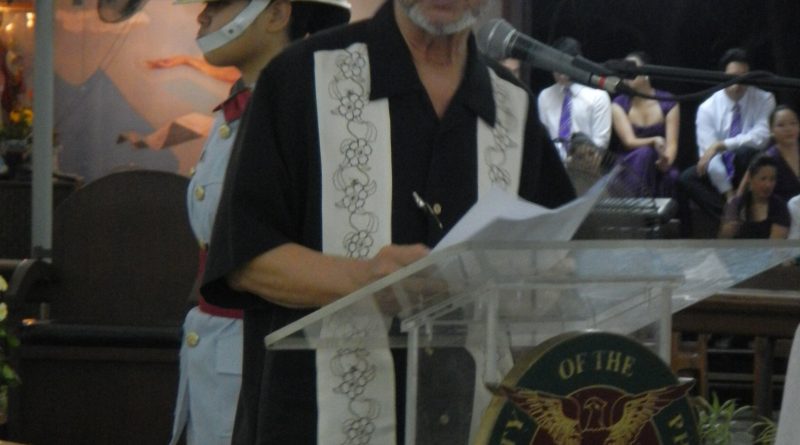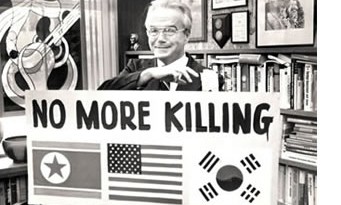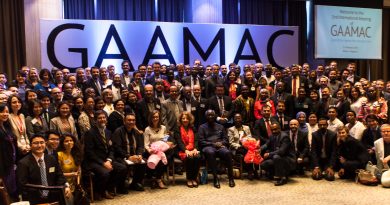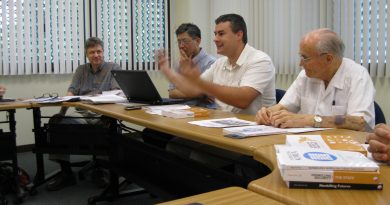Building the “Bohol Nonkilling Society”
“Bohol Nonkilling Society” was published by CGNK Governing Council member Jose “Pepe” Abueva in the The Bohol Chronicle weekly newspaper on February 16, 2014. Abueva suggests a number of practical proposals to advance nonkilling in this province of the Philippines.
“Bohol Peace Day” and Building the “Bohol Nonkilling Society”
On February 11 Boholanos celebrated two historic events: (1) the newly decreed Bohol Peace Day to be commemorated every year on February 11; and (2) the founding of the “Nonkilling Boholano Society.” Governor Edgar M. Chatto and Vice-Governor Concepcion O. Lim, Chairperson of the Bohol Sangguniang Panlalawigan (or Provincial Council), led a large number of leaders from the local government, the national government, and civil society in celebrating the occasion. Heavy rain stopped in time to make possible the joyful celebration.
Resolution No. 2014-055 (of the Bohol SG) authorized the annual observance of the Bohol Peace Day on February 11 and the founding of the Nonkilling Bohol Society. It acknowledged: (1) the province’s favorite son, President Carlos P. Garcia (1957-1961), who said: “I believe that our best contribution to the free world lies in our ability to maintain peace and security in our country”; and (2) the declaration of “Bohol an insurgency free province” on February 11, 2010. It also honors Bohol political and spiritual leaders, the police and the people for their sacrifice and prayers for peace.
The Nonkilling Boholano Society. BSG Resolution No. 2014-055 declares: “Resolved further that [Bohol Peace Day] shall be commemorated with fitting ceremonies and activities to be spearheaded by the Provincial Government of Bohol with the participation of all groups, organizations, institutions, and agencies advocating genuine and lasting peace under a nonkilling society. Year round programs/activities to promote a nonkilling Boholano society will be led by the Provincial Government.”
At the first Bohol Peace Day, new Tagbilaran City Mayor John Geesnell Yap II shared his youthful idealism and optimism in seeking peace and building a nonkilling Bohol.
In his moving and grateful keynote address Governor Chatto linked the inaugural celebration of Bohol Peace Day and the founding of the Bohol Nonkilling Society to the overall development program of the province under his leadership since 2010. He warmly acknowledged the active involvement and participation in the program of Boholanos residents in all walks of life, including the youth and foreign residents who took part in the celebration. He gave credit to the contributions to provincial development of local and national officials, business leaders, civil society, the media, the military and the police.
Messages were also given by Vice Governor Lim; the new director of the National Bureau of Investigation, Virgilio L. Mendez (a Boholano); Chairperson of the Commission on Human Rights Lorretta Ann P. Rosales; Commanding General Emmanuel Bautista of the Armed Forces of the Philippines; and a representative of Peace Process Secretary Teresita Quintos-Deles.
My talk on launching the Nonkilling Boholano Society. I gratefully acknowledged the response of the highest leaders in Bohol to my humble appeal that our own home province join the national Movement for a Nonkilling Philippines that a group of us, 17 scholars and civic leaders, had initiated in 2009. I said that we could all be proud that Bohol is the first among our 80 provinces to take up the challenge, and thereby inspire many more to join. I then shared our “Vision and Mission Statement for Building a Nonkilling Philippines.”
Our Vision. Building a nonkilling or killing-free Philippines marked by the absence of killing,
threats to kill, and conditions conducive to killing. A “just and humane society,” and “a democratic and republican State,” according to our Constitution, where the people’s various human rights are guaranteed and protected. For, in fact, most Filipinos, like other peoples, never kill in their whole life time. Like a disease, human violence is preventable and it can be minimized, and checked under certain conditions, according to the World Health Organization (WHO).
Our Mission. So let us all help to build a nonkilling Philippines in a life-sustaining just and humane society and a democratic and republican State. Let us observe the right of every Filipino to live and the responsibility never to kill. Let us create and maintain the conditions that will reduce violence and killing to the utmost. And let us seek to remove the conditions that lead to violence and killing.
Our inspiration in building “a nonkiling Philippines.” Our vision of a nonkilling Philippines is inspired by the vision and theory of “Nonkilling” introduced by Professor Glenn D. Paige of the University of Hawaii. This is contained in his seminal and influential book: Nonkilling Global Political Science (2002; 2009). He defined a “nonkilling society” as follows: “It is a human community, smallest to largest, local to global, characterized by no killing of humans and no threats to kill; no weapons designed to kill humans and no justifications for using them; and no conditions of society dependent upon threat or use of killing force for maintenance or change (Paige:1) Translated into some 25 languages, his book has inspired a global movement for a nonkilling world. Google
In practice our Movement for a Nonkilling Philippines aims for incremental and sustainable change that will make Filipinos value, uplift and sustain life, and create the conditions, structures and behavior that will drastically reduce violence and killing among them. It means building and sustaining peace, democratization, and socio-economic progress everywhere in the country for the good of all.
What is the rationale/justification for “building a Nonkilling Philippines?
1. Many of us, Filipino citizens and leaders, are concerned about the high level of violence, killings, forced disappearances, “internal refugees” displaced by armed conflict, and related violations of human rights.
2. In our Constitution we are committed to build “a just and humane society” and a democracy “under the rule of law and a regime of truth, justice, freedom, love, equality, and peace.”
3. We vow that “the Philippines adopts the generally accepted principles of international law as part of the law of the land and adheres to the policy of peace, equality, justice, freedom, cooperation and amity with all nations.”
4. Christianity and Islam are religions of love and peace that command us believers not to kill.
5. We know that violence, torture, cruel and unusual punishment, and the disappearances, killing and displacements of human beings cause incalculable human loss and suffering, and are thus prohibited and punishable by law.
6. “A nonkilling Philippines” is a desirable vision and a measureable goal. We should strive for a killing-free Philippines for the common good and in our national interest.
7. Principle 13 of the “Charter for a World Without Violence” adopted by the Nobel Peace Laureates in 2007 calls for “the right of everyone not to be killed and the responsibility not to kill others.”8. Contrary to what may be conventional wisdom, the killing of human beings is not inherent in human nature. In fact most peoples, including Filipinos, never kill a human being in their whole lifetime.
9. The killing of human beings, likened to a disease by the World Health Organization, can be prevented, mitigated, reduced, or even stopped under certain conditions.
10. Killings can spread and worsen under other conditions, such as when killers are often not apprehended, tried, and punished, and when they enjoy virtual impunity for their crime.
11. The Philippines is now one of an increasing number of countries around the world whose writers, artists, journalists, scholars, scientists, religious, and other citizens and leaders are now engaged in building nonkilling societies and thereby also a nonkilling world
Measuring, Monitoring, and Mapping Killings. To build a nonkilling Philippines we need to know much more about the incidence and specific causes of the violence and killings that happen. From year to year we really don’t know the true incidence of different kinds of violence and killings in various parts of the country and in the entire country.
The recording, monitoring, and mapping of the killing of human beings in the Philippines by the National Police Commission leave much to be desired. We should also seek more reliable knowledge and information about their probable causes and underlying conditions.
Under the circumstances, and for many more reasons, serious efforts to prevent, discourage and reduce violence and various kinds of killings, and to punish their perpetrators, are hampered.
We therefore propose setting up The Philippine Index of Killing/Nonkilling that will measure, monitor, and map nationwide every two years the killing of human beings. As we are able to determine the cause of the killings, we shall classify them into various forms: murder, homicide, abortion, infanticide, suicide, assassination, contract killing, death penalty, domestic killings, ethnic killings, and other forms of killing.
The Philipine Index of Killing/Nonkilling will indicate the incidence of killings by province, city and municipality and for the Philippines as a whole, so we will know the record of killing and nonkilling nationwide. We shall try to identify the kinds of persons who kill and those who are killed. We can then study the specific ways in which we can reduce killing and promote nonkilling communities and “a nonkilling Philippines.” We should be able to recognize and reward the most peaceful and nonkilling communities as exemplars.
Nonkilling communities would become more possible and attainable when we know of their existence in particular areas in the Philippines and deliberately aim to promote their development elsewhere in the country. We can help other communities to enhance their potential and capabilities for nonkilling peacefulness. We can help them to discourage and prevent killing for whatever purpose, and remove conditions that lead to killing.
Let’s initiate in Bohol the making of the Philippine Index of Killing and Nonkilling. Our leaders and people in Bohol can make a pilot study in designing and testing the proposed Philippine Index of Killing and Nonkilling. Our congressmen can then prepare the bill to establish the Philippine Index of Killing and Nonkilling and the program for rewarding our most nonkilling provinces and help our more violent and killing provinces to improve their condition.




